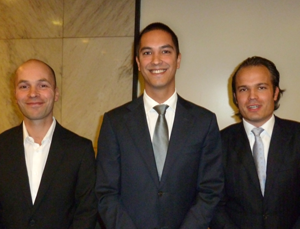Scanning sales people's brains?for factors that enhance their performance
In his research, Roeland Dietvorst has attempted to measure sales talent with the help of brain scans. With the use of these scans, he was able to pinpoint what processes underlie a salesperson’s ability to step into the mental shoes of a customer and understand their thoughts, feelings and intentions, and thereby gauge needs and find possible solutions. At a practical level, the results are used to develop and validate new scales that can be used in the selection and recruitment of new employees. In addition, the results inspire new methods of coaching and training that increase a salesperson’s ability to develop a customer orientation that leads to more productive relationships with customers in the long run.
Dietvorst graduated in biological and cognitive psychology. Insights from this field reveal the automaticity and mechanical nature of the human mind. Dietvorst found this particularly intriguing and it comes as no surprise that he chose brain scans research as his PhD project.
Roeland Dietvorst defended his PhD thesis, entitled Neural Mechanisms Underlying Social Intelligence and Their Relationship with the Performance of Sales Managers, on November 1. His promoter was Prof. Dr. Willem Verbeke. His co-promoter was Dr. A. van der Lugt. Other members of the Doctoral Committee were Prof. dr. R. Dur, Prof. dr. I.H.A. Franken, and Dr. F. Belschak.
About Roeland Dietvorst
 Roeland C. Dietvorst (1979) obtained his master’s degree in Biological & Cognitive Psychology in 2006 at the Erasmus University Rotterdam. He started his PhD research at the Erasmus School of Economics in the same year. His main research interests are neural mechanisms underlying social, affective and cognitive processes in the human brain, and their relationship with sales management, marketing, consumer behavior and decision making. During his PhD research he specialized in brain scanning and understanding two important psychological processes that underlie our ability to understand other people; Theory of Mind, and Mirror Neurons. Theory of Mind refers to the process of attributing mental states to others such as beliefs, intentions, and desires. This process is automatic or reflexive and associated with activity in a highly distinct and vast symmetrical neural network in the brain. Mirror Neurons are those neurons that fire both when we act, and when we observe that same action performed by another person, hence the name mirror neuron. According to leading researchers in the field, the importance of the discovery of mirror neurons for our understanding of human interaction can be compared with the importance of the discovery of DNA for evolution. The mirror neuron system is what makes people resonate with each other’s emotions, mirror neurons allow us to literally feel what other people are feeling. The aim of Dietvorst’s research is to understand how individual differences in the functioning of these social intelligence mechanisms relate to behaviors, and performance of professionals in organizations. Part of his work has been published in the Journal of Marketing Research.
Roeland C. Dietvorst (1979) obtained his master’s degree in Biological & Cognitive Psychology in 2006 at the Erasmus University Rotterdam. He started his PhD research at the Erasmus School of Economics in the same year. His main research interests are neural mechanisms underlying social, affective and cognitive processes in the human brain, and their relationship with sales management, marketing, consumer behavior and decision making. During his PhD research he specialized in brain scanning and understanding two important psychological processes that underlie our ability to understand other people; Theory of Mind, and Mirror Neurons. Theory of Mind refers to the process of attributing mental states to others such as beliefs, intentions, and desires. This process is automatic or reflexive and associated with activity in a highly distinct and vast symmetrical neural network in the brain. Mirror Neurons are those neurons that fire both when we act, and when we observe that same action performed by another person, hence the name mirror neuron. According to leading researchers in the field, the importance of the discovery of mirror neurons for our understanding of human interaction can be compared with the importance of the discovery of DNA for evolution. The mirror neuron system is what makes people resonate with each other’s emotions, mirror neurons allow us to literally feel what other people are feeling. The aim of Dietvorst’s research is to understand how individual differences in the functioning of these social intelligence mechanisms relate to behaviors, and performance of professionals in organizations. Part of his work has been published in the Journal of Marketing Research.
When Dietvorst is not scanning brains or designing experiments, you will find him at the reputable Institute for Sales & Account Management, where he teaches psychology of persuasion at the Sales & Account Leadership programs. He is a regularly invited guest speaker at international academic conferences and many business events. He also consults organizations in their development of training, selection & recruitment methods. Dietvorst’s central motivation to conduct research and lecture lies in his mission to confront people with the automaticity of human behavior and the lack of awareness thereof. During his lectures he provides eye-openers that give the audience a renewed appreciation of the sophistication of subconscious processes and their involvement in everyday life and work.
Abstract of ‘Neural Mechanisms Underlying Social Intelligence’
The performance and strategies of salespeople have been under the scrutiny of marketing scholars for many years. Identifying the drivers of salespeople’s performance, strategies and moral behavior has been the primary focus of this research. The functioning of the drivers of salespeople’s behaviors during selling interactions rests on assumptions about and processes going on in the minds of salespeople. However, research to date has used methods based only on verbal self-reports. Advances in techniques from neuroscience such as fMRI have inspired recent research in related areas, such as consumer behavior and economics, and suggest that despite their complexity and relative inaccessibility, mental processes can be measured more directly.
 Since the introduction of functional MRI as a research tool, our understanding of the psychological mechanisms that underlie social interaction has greatly enhanced. Two recent breakthroughs that social neuroscience produced, are the discovery of the Theory of Mind network and the mirror neuron system. These two mechanisms are thought to be the key drivers of social intelligence; both mechanisms are highly automatic or reflexive by nature and feed our intuition during social interactions.
Since the introduction of functional MRI as a research tool, our understanding of the psychological mechanisms that underlie social interaction has greatly enhanced. Two recent breakthroughs that social neuroscience produced, are the discovery of the Theory of Mind network and the mirror neuron system. These two mechanisms are thought to be the key drivers of social intelligence; both mechanisms are highly automatic or reflexive by nature and feed our intuition during social interactions.
In the thesis, three main questions with regard to individual differences in the functioning of Theory of Mind and mirror neurons were investigated: (i) Do salespeople that exhibit highly developed Theory of Mind skills also perform better? (ii) What are the cognitive and emotional bases of taking a customer orientation? (iii) How does Machiavellian Intelligence relate to Theory of Mind and mirror neuron functioning?
In order to understand the relationship between Theory of Mind skills and sales performance we developed a new theory driven scale that measures a salespersons ability to ‘read the mind’ of a customer: the Salesperson Theory of Mind (SToM) scale. Theory of Mind refers to the attribution of mental states such as intentions, beliefs and desires to interaction partners. Our results demonstrate that the SToM-scale produces very consistent results over different samples, and that the psychometric properties with regard to validity are excellent. Using insights and techniques adopted from neuroscience in order to develop this scale bared its fruits. Our research shows that salespeople with superior Theory of Mind skills perform better, and adapt more easily to different selling situations and buyers. Our SToM-scale in its present form is a useful tool in the investigation of salesforce behaviors. Our findings should inspire new methods for selecting and training salesforces.
With our second study we investigated what neural processes underlie a salesperson’s strategic orientation during sales encounters. Salespeople approach customers with one of two different strategies: some salespeople will focus on how to get a customer to buy as much as possible regardless of how much a wise customer should buy (also called a hard-selling approach), while other salespeople tend to focus on solving a customer’s problem or needs. Our results demonstrate that subjects that have a high Customer Orientation showed significantly more activation in regions in the brain that subserve our ability to resonate with other people’s emotions.
Our research findings suggest that only by stepping into the mental shoes of a customer and understanding their thoughts, feelings and intentions that one can gauge needs and find possible solutions. Management should therefore focus on the difference between having a Selling Orientation versus a Customer Orientation in its coaching, training and recruitment policies. Managers should also explain how skills in Theory of Mind and empathy promote a Customer Orientation, which in its turn leads to more productive relationships with customers in the long run. Finally, we investigated how Machiavellianism relates to Theory of Mind and mirror neuron functioning. Machiavellianism is a personality style or trait characterized by social conduct that involves manipulating other persons for personal gain. In order to explore the relation between social intelligence and Machiavellianism, a group of salespeople who displayed different degrees of Machiavellianism performed a Theory of Mind and a mirror neuron task while their brain activity was monitored with fMRI. In addition a number of main and interaction effects underlying the functioning of Machiavellians were investigated with field studies.
The most prominent findings of note are that Machiavellianism is negatively associated with Theory of Mind skills, and was found to be positively associated with a heightened affective resonance. Further, when Machiavellian salespeople operate in organizations that closely monitor their actions, their performance suffers; they compensate for this shortcoming by displaying increased overt organizational citizenship behavior.
At a practical level, our research shows that people should not rely on the loyalty and commitment to the company of Machiavellian employees because they may opportunistically pursue personal gain at the expense of customers and their company. In addition, our research shows that it is unfortunately difficult to recognize Machiavellians in the organisation, because Machiavellians show the highest levels of engagement in visible organizational citizenship behavior.


